Rosacea Tips
- Best ResultsVariable
- Treatment RecoveryNA
- Procedure Time2 minutes
- Skin SpecialistDermatologist
- Duration of ResultsLong lasting
- AnaestheticNA
- Back to WorkNA
- Cost$
Rosacea Tips
I call it the one percent rule. Each lifestyle modification can potentially improve one percent of your rosacea. With thought & precision you can improve your flare ups without the need for tablets or other medical intervention. Patients are encouraged to consider tips to understand the impact of topical creams, sunscreen, diet, supplements, stress, face washing, weather changes, emotion, hormones & other factors that may contribute to their rosacea. Every patient has a unique blueprint.
FactsFacts on the best Rosacea Tips
- Understanding your pattern of rosacea takes time
- Everyone has their own unique rosacea blueprint
- Keep skincare simple yet precise
- Focus on anti-inflammatory ingredients including niacinamide & azelaic acid
- Avoid peels, ascorbic & retinoic acid
- Understanding dietary flare-ups that pertain to you
- Keep a rosacea diary
- Lasers can reduce rosacea flare-ups, facial veins & redness
What to do before seeing me Rosacea Tips?
My job is primarily focused on lasers, acknowledging there are many ways to treat rosacea. Start by reviewing the section on skin care & creams for rosacea patients. I have also written a section on tablets for rosacea & natural therapies.
Keeping a diary is important as it can give you (& me) some guidance as to anything that may trigger, or conversely, improve your skin condition. Finally, I am a specialist dermatologist, hence a referral is required to see me. This will save you money when I perform laser treatments.
How do I approach rosacea?
I am the last line of management. My job is to decrease skin inflammation with lasers & to come up with novel solutions when all else fails. Most rosacea patients can be controlled on what I term a conventional approach. This includes.
- Anti-inflammatory washes
- Medically prescribed tablets including anti-inflammatories, & vitamin A
- Good skin care including cleansers, SPF & niacinamide
- Diet
- Stress management
- Alternative medicine

Your medical dermatologist can guide you through their own management algorithms. If you are after a natural alternative, do not see a dermatologist. Consult a naturopath & a dietician. Failing that (or in addition), I employ the use of energy devices including V Beam vascular lasers such as the Prima, Perfecta, Alex laser wavelengths, LP Nd Yag including Laser Genesis, IPL, BBL & LED Healite – Omnilux to help control your condition. I also employ Tixel & Botox in combination in some cases.
How long will it take to get my rosacea under control?
Depends on the complexity of your, your level of understanding & ability to analyse potential triggers & flare ups. Also depends on your level of comfort about taking mainstream medications & lasers for your condition.
Every dermatologist has a different mode of practice, mine is to get your condition under control in the fastest way possible, bearing in mind safety. Hence for most of my patients, it is a prescription of lasers, anti-inflammatories & topicals as discussed on this site.
Some patients prefer a step-up approach (this is fine, it is more conservative). This means you start on simple topicals, diet, supplements, then progress to prescription creams, possibly tablets, etc. If you are more inclined towards this approach, see a medical dermatologist to discuss options. Control takes between 1 to 12 months depending on the factors discussed above.
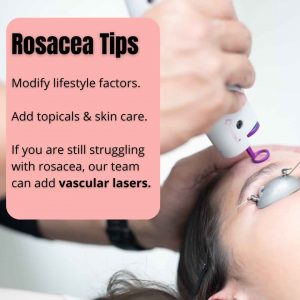
Why a rosacea diary?
Keeping a diary will give you a map of how to manage your rosacea in the shortest possible time & with precision. Keep a diary of your flare up factors. This will help you & your dermatologist understand your triggers. Annotate what makes your condition better & what flares it up.
This enables your medical dermatologist to be more precise with prescription patterns, rather than ‘having a go at stuff.’ Sure, in the initial phases of rosacea management, it will be a wee bit of trial and error. Rosacea is an adjustment disorder. The more analytical you and your dermatologist are, the faster you can figure things out.
Disclaimer: I am a procedural dermatologist. My role in the management of rosacea is laser. Medical management is complex, please see a medical dermatologist for ongoing care.

What are simple face washing rules?
Use a gentle cleanser, La Roche Posay makes good ones in the Effaclar & Rosaliac range. If you want cheap & nasty, Cetaphil is recommended by most older dermatologists.
- Wash twice a day.
- Water should be tepid, not hot
- Clean with your fingers/hands
- Pat, don’t rub with a washcloth
Some patients can tolerate salicylic acid washes. This beta hydroxy acid has anti-inflammatory properties in low concentrations. A good brand is La Roche Effaclar Micropeel, 2%. Another is Cerave with a lower concentration. This ingredient can act as a gentle exfoliant & potentially reduce inflammation, if you use it correctly. It is not for everyone with rosacea. Start twice a week, increasing as tolerated. Annotate the effects in your rosacea diary.
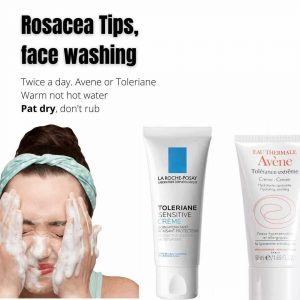

View our Treatment Gallery
What skin care ingredients are rosacea compatible?
Precision skin care is required if you have rosacea & sensitive skin. You can not afford to ‘have a go’ at things, or rosacea flares will occur. Your key ingredients are-
- Niacinamide or vitamin B3. This is anti-inflammatory & can help reduce flares.
- Hyaluronic acid is a natural substance that is great as a moisturizer & humectant.
- Azelaic acid is produced by yeasts & found in grains. It reduces inflammation.
- Antioxidants including green tea & tocopherol are usually well tolerated.

If you use the wrong ingredients, your skin will go backwards. Keep it simple, keep it precise.
What skin care ingredients can flare up rosacea?
Generally, the acids, apart from azelaic & very low strength salicylic acid. Rosacea falls under the umbrella of sensitive skin. You have to be very careful when adding new skincare ingredients. Be guided by your skincare expert.
Potential flares: Glycolic acid, lactic acid, ascorbic acids, retinoic acids.
Compatible products: azelaic acid, niacinamide, hyaluronic acid, resveratrol, tocopherol, retinyl palmitate. Low strength salicylic acid wash can be tolerated by most.
Rosacea, treated with V BEAM Prima, by @candelamedicalanz
.
👉Settings 11 mm spot, 6 ms, 6.5 J
.
🔫Laser: The V Beam is one of the best lasers for vascular work, primarily because of its dynamic cooling spray. I do have devices such as IPL/BBL & 1064 Nd Yag lasers with cooling plates but I personally don’t like them much
.
👍🏻Advantage of spray: fire & forget, it’s on, it’s safe, it’s more comfortable for the patient
.
👉Coupling gel & cooling plates: Adds many more steps as to what can go wrong
.
👉Gel required
.
👉Enough coupling gel needed
.
👉Cooling plate needs to be cold
.
👉Contact with the gel throughout the process
.
👉No feedback if cooling is fault
.
👉Then you gotta clean up your mess
.
👍🏻Just my 2 cents worth on vascular lasers
.
😎Davin Lim
Dermatologist
Brisbane🇦🇺
.
#vbeam #vbeamprima #rosacea #rosaceatips #rosaceatreatment #roscaeacure #rosaceaskincare
#drdavinlim #dermatoloigstbrisbane #skinscience
Version 2 of rosacea management via stories, tap for the algorithm as to how to manage rosacea. This will be part of my pre-consultation process once I iron out the bugs. Please provide feedback🙏🏼
.
🔬Skin science: Rosacea skincare is tricky. Start slow, titrate, analyse what you can tolerate & what flare up your skin
.
☀️Sunscreen is essential. Most will tolerate LRP Anthelios, either chemical or hybrid physical (depending on which country you live in). Invisible Zinc if you want pure physical SPF
.
👊Actives: Stick with hyaluronic acid, niacinamide, & azelaic acid
.
😳What about retinol/retinoids? It is not an absolute contraindication, but you will require care & titration
.
🔫What about procedures? Lasers over chemical peels. Lasers include vascular laser, QSL, #pico, #dermaltoning, laser genesis. If you want #Fraxel or ablative CO2, cover with doxycycline for 3 weeks, add vascular laser for rebound redness
.
🎬Action: Book a consult with my colleagues & clinical team @cliniccutis
.
👍🏻Management & options: Surf the algorithm in the stories. This is version 1.2, still requires more branches, feedback will be great (including any bugs you have found). I have based answers on probability not possibility, taking into account the time vs completion rate to maximise information & minimise drop-outs. As the algorithms evolve I will allow for ‘skip’ segments to allow faster completion times, or more detail for those wanting it
.
😎Davin Lim
Dermatologist
Brisbane🇦🇺
@cliniccutis
.
#drdavinlim #drdavinlim #skin #skincare #rosacea #rosaceaskin #rosaceatreatment
#rosaceaskincare #rosaceasupport #rosaceacommunity #rosaceacure #dermatologist
#dermatology #dermatologistbrisbane #rosaceatips #skinrejuvenation #rosaceaskinrejuvenation #cutisclinic
Vascular lasers are one of the most commonly utilised lasers in #dermatology
.
.
🔬Skin Science: Vascular lasers target haemoglobin. The bigger the number the deeper the penetration. My most frequently used wavelengths include 595 & 1064, occasionally 755 alex
.
.
👉👍🏻Most Common Conditions: #rosacea, post acne marks - PIE/ post inflammatory erythema, active inflammatory #acne (adjunct to medical), teles, #spidernaevi, vascular birthmarks including #portwinestains, post surgical redness, #stretchmarks (red-early), red bits of #poikiloderma & vascular component of #melasma. In general most red conditions can be improved-treated with vascular lasers
.
.
💯Skincare: Is important for prevention. Sunscreen can help with many red conditions including rosacea, melasma, PIE from acne & even photosensitive seb derm. Simple cleansers & moisturizer best for rosacea. I don’t use topicals such as brimonidine - #Mirvaso as the rebound rate is too high. Usual anti-inflammatory such as #azelaicacid as adjunctive management in some cases
.
.
🎬Action: Book with my clinical team @cliniccutis. They will find a solution for your redness. We have 5 vascular energy devices covering 595 to 1064 nm plus IPL/BBL, hence in the majority of cases redness can be easily treated ! I am happy to see complex or resistant cases including birthmarks
.
.
😎Dr Davin Lim
Brisbane, 🇦🇺
@drdavinlim
@cliniccutis
#skinscience #beautyscience #dermatology #dermatologist #brisbanedermatologist #laserrejuvenation #drdavinlim #davinlim #rosaceatips #rosaceaskincare #rosacealaser
🔬Skin Science: It is complex. Essentially rosacea is genetic, with input from many external factors as listed below. Unlike the aetiology of #rosacea, skincare should be simple
.
.
👀Rosacea triggers: These are as individual as you are. Getting to know and learn what triggers your rosacea will give you an edge over this common skin disorder. Triggers include sun-UV exposure, stress, heat, wind, exercise, ETOH, foods, changes of weather, wind, & skin care products (esp acidic or low pH products)
.
.
🥵Sensitive skin + Rosacea: For my rosacea patients, I normally start you on #niacinamide before other topicals, as this compound is anti-inflammatory. B3 can be combined with other topicals as long as the pH is over 5.0. #retinol with caution, #ascorbicacid with EXTREME caution. For further information discuss your skin care issues with my clinical team @cliniccutis
.
.
🔍Who to see if you have rosacea? Your family physician can guide you with treatments, including the use of topicals such as #rozex & azelaic acid. Tabs include anti-inflammatory meds can be prescribed by your GP. Vascular lasers & #IPL can reduce both inflammation as well as redness associated with rosacea. Attempt to control your condition with the usual topicals & tabs prior to seeing a dermo
.
.
💉Last line treatments: Patients that fail laser can give #Botox & #tixel a trial or micro-Botox with #aquagold
.
.
😎Dr Davin Lim, Dermatologist
Brisbane. Australia
🇦🇺
.
#skincare #skinscience #healthyskin #skinscience #rosaceaskincare #nomorered #skincarescience #drdavinlim #davinlim
.
Disclaimer: I am a procedural dermatologist, namely I laser-lase, inject, & cut. Skin care, though important, is not my usual occupation. I do give out sensible advice pertaining to your procedure. For an in-depth analysis of topicals, discuss your concerns with my clinical team @cliniccutis 👍🏻💯or discuss medical options with your dermatologist
How do you introduce a new skin care line or ingredient?
Very slowly with thought & understanding of your skin’s threshold. Everyone’s skin has a unique threshold, exceed this an sh*t will happen. With rosacea the threshold is markedly reduced.
Start with every second or third nightly application. Perform a test patch in front of your ear (one inch square). If you have no irritation after a week, apply to larger areas. After another week, increase.
If you have a rosacea flare up, stop immediately. Record this in your diary, use or modulate as tolerated. Understand how to salvage your skin if irritation occurs.
What is the best sunscreen?
In short, the one you are most likely to use. UV is the number one flare factor in rosacea, reported in over 80% of patients. Physical sunscreens including zinc & titanium dioxide are best tolerated for patients with sensitive skin. La Roche Posay makes cosmetically elegant, high factor, cost-effective hybrid sunscreens
My suggestion, try before you buy. The proper way to use SPF is to apply twice a day. One 50 ml bottle should last you 2-3.5 weeks. Hats, umbrellas & window tints are useful.
Can diet play a role in rosacea?
Absolutely. The best way to figure out any dietary flare ups is to keep a rosacea diary. As a general rule (not absolute as flare ups are as individual as you are);
- Avoid- refined packaged & processed foods including meat, sugar, refined flour, processed vegetables. Avoid or markedly reduce alcohol. Hot drinks can also flare up in some cases.
- Eat- prebiotic high fibres foods, at least 25 grams daily. Substitute vegetable oil for olive oil. Supplement with omega 3 fish oil. Supplement with anti-inflammatory herbs like cloves, turmeric, ginger & sage.
Some naturopaths believe that there is an association between rosacea, intestinal overgrowth, guy inflammation & dysbiosis.
If you are naturally inclined, see a naturopath as they can discuss methods of addressing gut inflammation & correct dysbiosis with gut-healing. Naturopaths focus on an elimination diet that addresses triggers & focuses on an anti-inflammatory Mediterranean diet.
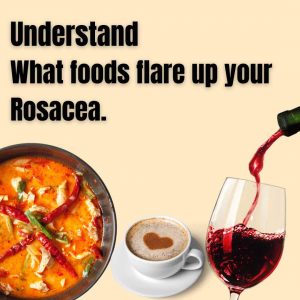
Disclaimer: I am a procedural dermatologist. My skill sets are not dietary/naturopathic; however dermatologists acknowledge dietary contribution can be significant in most cases of rosacea. Sorting out your diet can make a difference in some, & in some cases prevent dermatologists from prescribing drugs such as antibiotics & vitamin A derivatives including Accutane. My job is the dude that you see last, I laser.

What makeup is best for rosacea prone patients?
Dermatologists endorse mineral makeup, essentially paraben free & talc free. There are many brands on the market. Try before you buy. For makeup advice, see my staff at The Formulated.
What is the go with grog?
Frequently blamed as a flare factor, alcohol may pertain to your rosacea trigger. In most cases it is red wine over white. Record this down in your rosacea diary to correlate intake & flare.
What is the one percent rule of rosacea management?
Even the smallest modification counts. It all adds up. For example, using the correct makeup may give a 1% improvement, changing your cleanser another 1%, niacinamide 1%, better SPF 1%, proper face washing 1%, quick tepid showers may give you 3% (bonus), & so on. As a single lifestyle change one percent is not seen, but all everything up, you may get 20-60%.
You have got to find the correct combination for your pattern of rosacea. If you want more information, I suggest going to rosacea.org to understand more.
What aspect of showers is one of the most common flare factors for rosacea?
Heat. It is common to have long hot showers with lots of steam, especially in winter. It feels good, I understand. This is probably one of the most common flare factors in patients. Showering more than 3 minutes is a luxury that rosacea patients cannot afford. Tips are-
- Tepid showers ( I am not asking for cold showers)
- 2-3 minutes (This will allow time to clean every nook & cranny)
- Soap substitutes, & oatmeal shampoo – conditioner (most contain sodium lauryl sulphate)
- Pat your face dry, do not rub.
- Consider cooling your face after showers to reduce rebound redness.
How to look after your eyes- ocular rosacea?
One quarter of rosacea patients will have ocular rosacea or eye signs. This includes dry eyes, itchy & runny eyes as well as eye irritation including conjunctivitis. For an accurate management plan, consult your ophthalmologist. Tips include-
- Anti-inflammatory tablets including tetracyclines, doxy & minocycline.
- Short course topicals such as prednisone eye drops.
- Eye baths with saline – salt water.
- Drops & ointments including Refresh Eye range
- IPL, BBL & vascular lasers
- Sunglasses & eye protection
What can be done for exercise induced rosacea flare ups?
This is difficult as physiologically elevated heart rate will flare up rosacea in up to 80% of cases. The flipside is that exercise is good for you, & releases endorphins that can reduce stress levels, in turn reducing rosacea flare ups. It’s a compromise. Here are some tips that may or may not work;
- Keep exercise to short bursts of say 7-15 minutes. This is called interval training. This allows time for your body to cool off.
- Ice application during your rest periods, especially if you are at the gym.
- Keep ambient humidity low. If possible, training with air conditioning.
- Remember lots of SPF if you are exercising outside. Use a sticky zinc based waterproof sunscreen.
- Cool drinks & water spray can help keep you cool & hydrated.

You don’t need to quit exercise, just work on the recovery.
What foods can trigger rosacea flares?
Firstly, figure out what your triggers are. The best way is to keep a rosacea diary. Next optimise your dietary intake with prebiotic & probiotic foods.
Avoid- refined packaged & processed foods including meat, sugar, refined flour, processed vegetables. Avoid or markedly reduce alcohol. Spicy foods, including chilli, curry, and wasabi can potentially flare up rosacea.
Eat- prebiotic high fibres foods, at least 25 grams daily. Substitute vegetable oil for olive oil. Supplement with omega 3 fish oil. Supplement with anti-inflammatory herbs like cloves, turmeric, ginger & sage.
Any specific food related questions should be directed to your dietician.
What are the best anti-aging procedures for rosacea prone patients?
By far, lasers & light-based procedures are the most effective. Chemicals including peels & skincare active can flare up rosacea. Avoid glycolic, lactic, mandelic & retinoic acids. Some patients can tolerate retinol or retinyl palmitate. 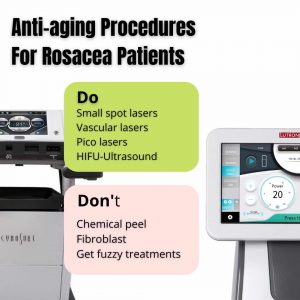
The most effective anti-aging procedures are laser based & should always combine a vascular laser. Options include.
- Thulium 1927 Clear & Brilliant + V BEAM
- Fraxel 1927 + V BEAM
- LaseMD +V BEAM
- IPL-BBL
- Laser Genesis
- Tixel + Botox +/- V BEAM
For simple rejuvenation work, consult my nurses, alternatively book an appointment with myself.
What are biostimulator injections & why are they great for rosacea patients?
These group of injectables are placed under your skin to stimulate collagen. They stimulate collagen without the generation of heat, hence they do not flare up rosacea prone skin.
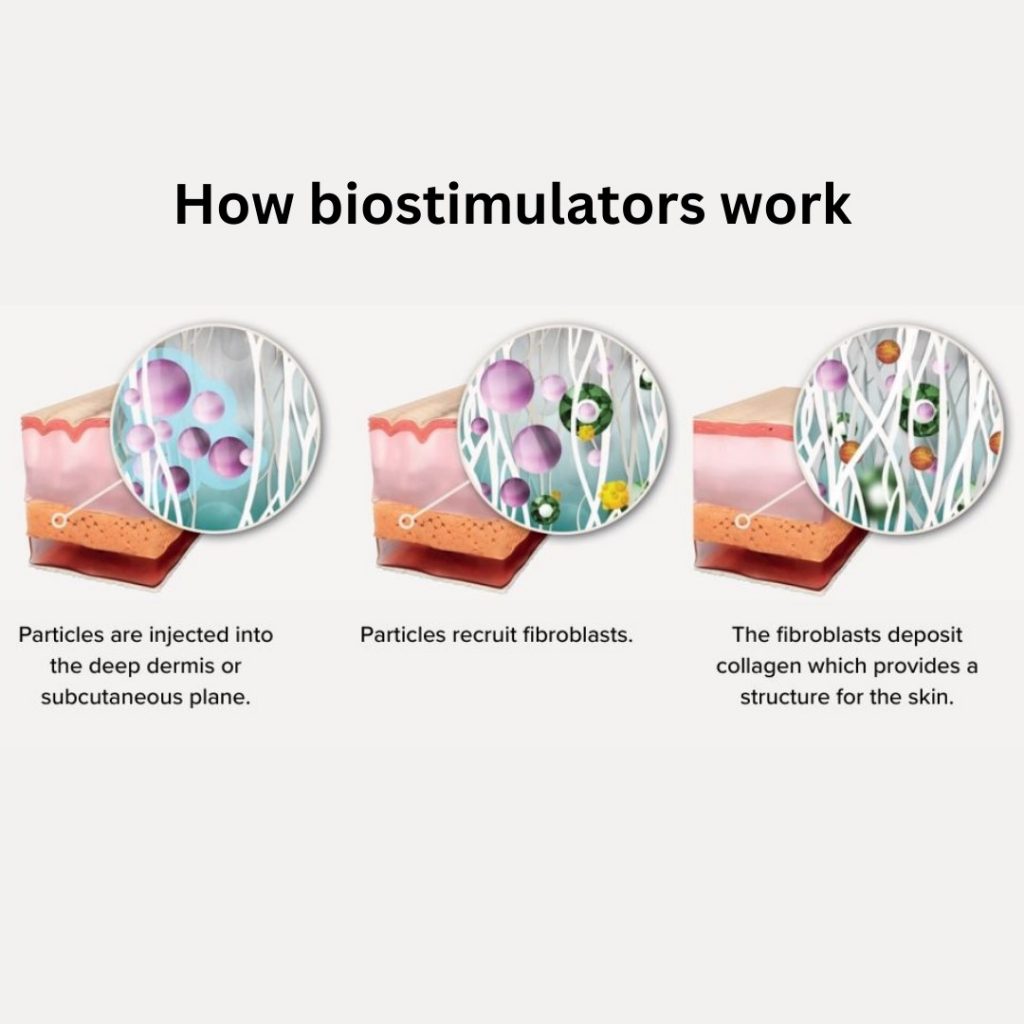
Biostimulants are an ideal solution for anti-aging in rosacea patients. 2-4 sessions are required for optimal outcomes.
More on biostimulators for Anti-aging.
What supplements can help rosacea sufferers?
Some herbal supplements & essential oils can help reduce inflammation. This can reduce rosacea flares. This is the list of the usual essential oils & plant-based extracts normally prescribed for rosacea.
Aloe vera is the go-to plant for skin inflammation. You can either use the sap of the plant, or buy prepacked gel extracts. Contact dermatitis is a rare side effect.
Camomile can be used as a drink (tea) or topically as compresses. Low chance of allergic contact dermatitis.
Green tea: probably has the most medicinal properties & merit. It is a potent antioxidant with scientific data. Drink it, it’s good for you.
Fever few is another plant. It has antioxidant properties as well as very mild sun protection- in theory.
Other botanical extracts include raw honey, ginger, rosemary & thyme. Consider using other naturally derived extracts including azelaic acid & niacinamide topically.
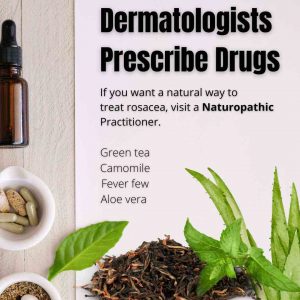
What has stress got to do with skin?
Lots. Stress, either physical, emotional or mental can flare up any dermatological condition including acne, psoriasis & rosacea. I am the wrong person to provide suggestions to controlling stress, so I won’t even try. Consult-
- Your GP
- A psychologist
- A psychiatrist
- Some who does alternative stuff like yoga, acupuncture, meditation
What lasers do I use to treat rosacea?
Vascular lasers are employed to treat rosacea. In Brisbane I use: VBeam Prima, Perfecta, DermaV, as well as IPL and BBL.
In Sydney I use ExcelV laser.
Davin’s Viewpoint on Rosacea Tips
Rosacea is a type of adjustment disorder. It is chronic, there is no cure, but with careful thought & analysis, most patients can figure it out. Some take 6 months, a minority may take 2-3 years, & a smaller number won’t (or refuse to) figure it out.
A dermatologist’s job is to guide rosacea patients accordingly. My job is to treat the ones that are recalcitrant to conventional therapy, this includes naturopathic treatments if patients are so inclined. My colleagues will prescribe medication (not fairy dust), so before seeing them you should modify (or try to at least) lifestyle factors including UV exposure, diet, alcohol intake (if it pertains to your flare up) & all aspects of skincare. This includes cleansers, moisturizes, makeup & skin care actives. I have summarized as much as I can on this page, for more tips, goto rosacea.org
A good way to manage your condition is to seek advice from peers, namely rosacea patients. Join a supportive forum & start posting. I know Australia has a great rosacea site run by David Pascoe.



